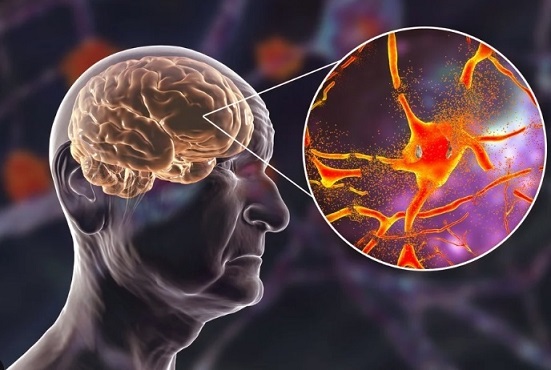Study Shockingly Finds That the Nucleocapsid Protein of the COVID-19 Virus Triggers Brain Cell Aging!
Nikhil Prasad Fact checked by:Thailand Medical News Team Jun 21, 2025 7 months, 4 weeks, 4 hours, 15 minutes ago
Thailand Medical News: Alarming Link Between COVID-19 and Brain Aging Uncovered
A new study by researchers from Central South University and Xiangya Hospital in China has uncovered troubling evidence that a key protein from the SARS-CoV-2 virus—the nucleocapsid protein, or N protein—can directly damage brain cells and trigger cognitive decline. This
Thailand Medical News report sheds light on how even after the initial infection has passed, the remnants of the virus may silently wreak havoc on the brain by accelerating the aging of microglia, the brain’s immune cells, through an energy shift process called glycolysis.
 Study Shockingly Finds That the Nucleocapsid Protein of the COVID-19 Virus Triggers Brain Cell Aging
Study Shockingly Finds That the Nucleocapsid Protein of the COVID-19 Virus Triggers Brain Cell Aging
The study reveals that exposure to the SARS-CoV-2 N protein leads to widespread senescence (aging) of microglial cells, which are essential for maintaining normal brain function. This process, driven by mitochondrial dysfunction and a shift from healthy energy metabolism to abnormal glycolysis, results in memory loss and impaired cognition. The findings raise concerns about the long-term neurological effects of COVID-19, especially for those with repeated infections or prolonged symptoms.
How the Viral N Protein Targets the Brain
The SARS-CoV-2 nucleocapsid protein is one of the most abundant and conserved viral proteins. It plays key roles in viral replication, packaging, and immune evasion. Recent studies have shown that this protein can travel beyond the lungs and reach the brain. In the current study, scientists demonstrated that the N protein can penetrate the blood-brain barrier and accumulate in memory-related regions such as the hippocampus.
When mice were exposed to the N protein intranasally over 14 days, they showed significant signs of cognitive impairment. Tests like the Open Field Test and Y-maze showed reduced movement, slower speeds, and a lack of curiosity or memory recall. Additionally, brain tissue analyses revealed substantial neuronal damage and elevated levels of abnormal proteins associated with Alzheimer’s disease—namely amyloid precursor protein (APP) and phosphorylated Tau (p-TauT231).
Microglial Senescence as the Key Driver of Brain Decline
Central to the study's findings is the role of microglia, which are the brain’s resident immune cells. Under normal conditions, microglia protect the brain by removing waste and regulating inflammation. However, when these cells age prematurely or become senescent, they release harmful inflammatory molecules and lose their protective functions.
In this study, exposure to the N protein caused a dramatic increase in microglial senescence markers such as p16, p21, and p53, both in mouse brains and in cultured microglial cells. These aged microglia also secreted inflammatory cytokines, further damaging surrounding neurons. The result was a toxic cycle of inflammation and cellular dysfunction that led to widespread cognitive impairment.
r />
Glycolysis and Mitochondrial Dysfunction Play Central Roles
The researchers discovered that the N protein pushes microglia into a state of metabolic distress. Instead of producing energy through the efficient process of oxidative phosphorylation, the cells switch to glycolysis—a less effective and more damaging method of energy production. This shift leads to the accumulation of lactate and increased stress within the cells.
This metabolic reprogramming was directly linked to mitochondrial fragmentation. Mitochondria, the energy centers of the cell, lost their normal shape and function. Increased activity of the mitochondrial fission protein DRP1 was observed, and when researchers blocked this fission process using the inhibitor Mdivi-1, many of the damaging effects on microglia were reversed.
Similarly, treatment with the glycolysis inhibitor 2-DG significantly reduced brain inflammation, restored mitochondrial health, and improved behavior in the mice. Mice treated with 2-DG moved more freely, explored novel environments with greater curiosity, and showed fewer signs of neuronal damage.
The Hidden Threat of Viral Debris After Infection
These findings highlight a dangerous reality—components of the virus, like the N protein, may linger or be reactivated in the body long after the infection subsides. Even in the absence of full-blown illness, such residual proteins could silently accelerate brain aging and impair memory.
The implications are vast, particularly for older adults or those suffering from long COVID. The presence of viral proteins in the central nervous system could be a key factor in the unexplained brain fog, memory issues, and fatigue many people report months or even years after their initial infection.
Conclusions and Warnings for the Future
This study provides compelling evidence that the SARS-CoV-2 N protein can cause cognitive damage by forcing brain immune cells into an aged, dysfunctional state through energy metabolism disruption. The research identifies a clear pathway—mitochondrial dysfunction leads to excessive glycolysis, which in turn drives microglial senescence and neurodegeneration. By blocking this glycolytic shift, researchers were able to reduce brain damage and restore cognitive functions in mice.
While further studies in humans are needed, the message is clear: even a single SARS-CoV-2 infection may carry long-term neurological risks. Therapies targeting energy metabolism and mitochondrial health could be key to preventing or treating post-COVID cognitive issues. The growing understanding of how this virus affects the brain must guide public health strategies and future treatment developments.
The study findings were published on a preprint server and are currently being peer reviewed.
https://www.researchsquare.com/article/rs-6872703/v1
For the latest COVID-19 News, keep on logging to Thailand Medical News.
Read Also:
https://www.thailandmedical.news/news/romanian-study-warns-that-covid-19-increases-risk-of-brain-bleeding
https://www.thailandmedical.news/news/american-doctors-warn-of-alarming-rise-in-dangerous-brain-complications-in-children-after-covid-19-pandemic
https://www.thailandmedical.news/news/doctors-warn-that-covid-19-can-cause-brain-death-in-children
